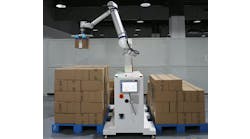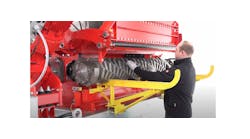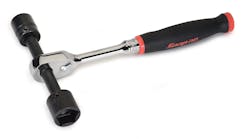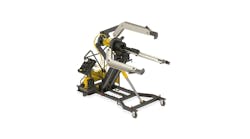By Brian Sullivan
Rob Dumont: "Right now, trade policy is not dictated by Congress. It's dictated by the multinational corporations … You cannot have the trade deficits we have with total and absolute disregard for people." TMTA president and CEO Rob Dumont
When multinational corporate interests shower Washington with hundreds of millions of dollars in campaign contributions and lobbying efforts, they get what they want at the expense of ordinary citizens — ordinary citizens like you who own and operate small and mid-sized manufacturing companies.
Over the years the multinational corporations have backed trade legislation that has been beneficial to them and detrimental to small and mid-sized manufacturers. Manufacturing has been decimated in the Midwest, and now the damage is spreading to every other geographic area in the country. Small and mid-sized domestic manufacturers need advocacy help at the federal level and they need it now.
The Tooling, Manufacturing & Technologies Association (TMTA, www.thetmta.com) is helping. Driven by growing resentment among small and medium-sized manufacturers over the escalating trade deficit and the unwillingness of the federal government and national trade associations to represent the interests of domestic manufacturers aggressively, this 74-year-old association had become vocal. "We're ruffling feathers. We're aggressively inviting people to join our association. We're being met with resistance, but we've got a determination that isn't paralleled by any association that I'm aware of," explains TMTA president and CEO Rob Dumont.
"The multinational corporations have way, way too much influence in Washington, DC, and that has got to change," according to Dumont. "Right now, trade policy is not dictated by Congress. It's dictated by the multinational corporations based on making a quick buck in the short term. You cannot have the trade deficits we have with total and absolute disregard for people. It's a national disgrace."
The Tooling, Manufacturing & Technologies Assn. believes that the answers to most of the problems facing small and mid-sized domestic manufacturers will be found through trade-reform legislation at the federal level. The issue, and the particular piece of legislation, that is currently front and center is H.R. 2942, The Currency Reform Fair Trade Act of 2007. Getting currency manipulation legislation would be one huge foot forward in the overall struggle for complete trade-law reform. TMTA is on Capitol Hill, lobbying for passage of the bill on behalf of small and mid-sized manufacturers much of the time.
There should be more vocal and aggressive advocates for small and mid-sized manufacturers at the federal level. Regrettably, TMTA recently decided not to renew its membership with the National Association of Manufacturers (NAM) because it feels that the NAM is supporting large multinational corporate interests at the expense of small and mid-sized manufacturers — especially on recent currency reform legislation. "John Engler (president of NAM) has been completely blinded by the larger business interests that are running NAM, and it's patently obvious to me that they have done very little to help the plight of the small manufacturer," states Herb Trute, TMTA chairman and president of T&W Tool and Die Corp., outside Detroit.
It's that argument that has prompted the Tooling, Manufacturing & Technologies Assn. to take up the fight on behalf of small and mid-sized manufacturers nationwide. Since January, the TMTA has grown to member operations in 21 states and has more than doubled the total membership employee head count from 22,000 to over 47,000. Growth on that scale is remarkable for an association in just seven months, and its proof that there is a demand for such a message among small and mid-sized manufacturers who believe that they're getting a raw deal in Washington, DC.
TMTA is not a single-issue caucus, advocating just for currency manipulation reform, although, right now, it's at the top of the list. TMTA advocates on behalf of members on issues pertaining to trade imbalances, infrastructure imbalances (like regulatory standards), enforcement standards, support for a National Trade Strategy, border adjustable taxation, VAT taxes, countervailing duty laws, the review of all existing bilateral agreements, Rules of Origin standardization, fair labor, and environmental standards, etc.
Also, TMTA has aligned itself with other forces within manufacturing, agriculture, consumer groups, and even labor. Several years ago any trade association aligned with labor would have been branded as heretics but, now, desperate circumstances call for desperate measures when it comes to trade reform. TMTA subscribes to the adage that the ‘enemy of our enemy is our friend'. Our enemies are the forces of multinationalism and corporate-controlled globalism that are destroying small and mid-sized domestic manufacturers, and the effects of what they do damage to every other area of society.
So, when powerful multinational interests shower Washington with millions of dollars in campaign contributions, they get what they want. But, it's ordinary citizens and small and mid-sized manufacturers who pay the price, and most never see it coming. Here's what happens if you don't contribute to their campaigns or spend generously on lobbying. You pick up a disproportionate share of America's tax bill. You pay higher prices for a broad range of products from peanuts to prescriptions. You pay taxes that others in a similar situation have been excused from paying. You're compelled to abide by laws while special interests are granted immunity from them. You must pay debts that you incur while they do not. You're barred from writing off on your tax returns some of the money spent on necessities, while others deduct the cost of their entertainment. You must run your business by one set of rules, while the government creates another set for your competitors.
In contrast, the powerful few who contribute to the right politicians and hire the right lobbyists enjoy all the benefits of their special status. Make a bad business deal, the government bails them out. If they want to hire workers at below market wages, the government provides the means to do so. If they want more time to pay their debts, the government gives them an extension. If they want immunity from certain laws, the government gives it. If they want to ignore rules their competition must comply with, the government gives its approval. If they want to kill legislation (like currency manipulation legislation), it gets killed.
So what's to be done? The only answer to powerful, organized multinational money is organized people. Now more than ever, average citizens, and certainly those who own small and mid-sized manufacturing businesses, need to be represented by entities that are looking out for their interests, like the Tooling, Manufacturing & Technologies Assn.
Small and mid-sized manufacturers need to realize that if they don't become involved and engaged in the fight for trade-law reform, manufacturing, as we know it, could disappear in the U.S. in the coming decades. This is a fight that calls for involvement. Power concedes nothing without a demand. Find out just what people will submit to, and you have found the exact amount of injustice and wrong that will be imposed on them."
Leading into the next general election, the domestic manufacturing industry has a real chance to make significant changes relative to trade-law reform because it will be one of the most important issues in the next election cycle. Right now, the Tooling, Manufacturing & Technologies Assn., aligned with groups within manufacturing, agriculture, consumer groups, and labor, are engaged in Town Hall meetings across the country where presidential primaries are occurring, where the "grass roots" people are educated about the critical state of manufacturing, and the need for tradelaw reform. And, when the presidential candidates arrive these primary towns to stump, they're made to explain what they're going to do to enact trade-law reform.
Twice within the last several months, Rep. Duncan Hunter, the co-sponsor of the current Currency Reform Fair Trade Act, and a Republican presidential candidate, has visited the offices of the Tooling, Manufacturing & Technologies Assn. to discuss with small and mid-sized manufacturers the trade-law changes that need to be enacted to save manufacturing in this country.
What can you do? Join the fight to save manufacturing in the U.S. by joining the Tooling, Manufacturing & Technologies Assn., and become active participants rather than passive observers of our industries.
Brian Sullivan is director of sales, marketing, and communications for The Tooling, Manufacturing & Technologies Assn. Contact him at 248.488.0300 x 1307, or [email protected].










